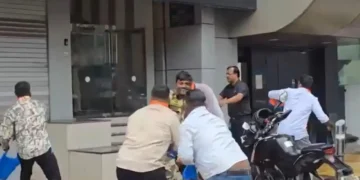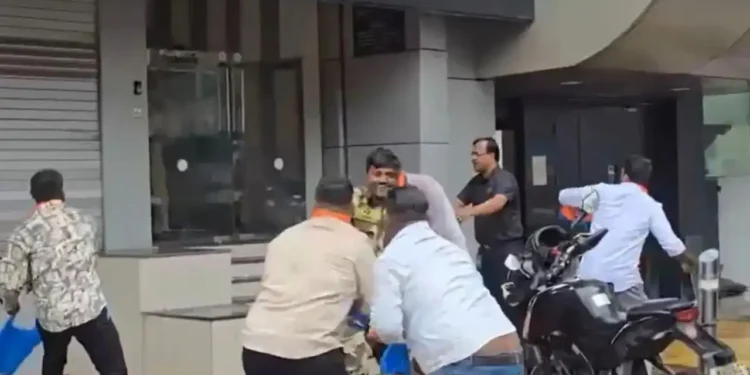MNS workers vandalize entrepreneur Sushil Kedia’s Mumbai office after his viral post refusing to learn Marathi, tagging Raj Thackeray. The incident ignites a heated debate on language politics and regional pride.

MNS Workers Vandalize Entrepreneur Sushil Kedia’s Office Over Marathi Language Row
Viral Clash Over Marathi Language Sparks Debate on Freedom of Speech and Regional Identity
Mumbai witnessed high drama as Maharashtra Navnirman Sena (MNS) workers vandalized the office of businessman Sushil Kedia, after his controversial post on X (formerly Twitter) about the Marathi language. Kedia’s post, perceived as defiant and provocative by MNS supporters, ignited a furious backlash, bringing the issue of linguistic identity back to the forefront of Maharashtra’s political landscape.
What Triggered the Controversy?
The incident unfolded after Sushil Kedia, a prominent entrepreneur, publicly declared his refusal to learn Marathi despite living in Mumbai for over three decades. In his viral post, Kedia tagged MNS chief Raj Thackeray and wrote:
“I don’t know Marathi properly even after 30 years in Mumbai & with your gross misconduct, I take pratigya (vow) I won’t learn Marathi.” Raj Thackeray
The post, seen by many as a direct challenge to MNS’s long-standing campaign for the promotion of Marathi language and culture, quickly went viral. Supporters of the MNS accused Kedia of disrespecting the local language and questioned his commitment to Mumbai’s cultural ethos.
Office Stormed by MNS Workers
Soon after the post gained traction online, a group of MNS workers stormed Sushil Kedia’s office in Mumbai. Videos circulating on social media show them shouting slogans and vandalizing property, smashing nameplates and furniture in the process. The footage triggered outrage across platforms, with opinions sharply divided on the issue.
While MNS workers defended their actions, calling it a “lesson” to those who insult the Marathi language, others condemned the violence, emphasizing the importance of dialogue and peaceful protest in a democratic society.
Debate Over Language Politics Reignites
This latest incident has reignited the long-simmering debate on language politics in Maharashtra. The MNS, known for its aggressive advocacy of Marathi pride, has been involved in several similar controversies in the past, targeting individuals and businesses for allegedly neglecting the Marathi language.
Supporters of Kedia argue that language should be a personal choice and that no one should be forced to adopt a language against their will. Many prominent voices on social media expressed solidarity with Kedia, stating that freedom of expression must be protected at all costs.
On the other hand, MNS loyalists and some local leaders accused Kedia of deliberately disrespecting Marathi culture and hurting the sentiments of the local population for social media attention.
Political Leaders React
The incident has drawn reactions from across the political spectrum. Some political leaders have called for calm and urged both sides to refrain from inflammatory rhetoric.
An MNS spokesperson defended the attack, stating, “If you are living in Maharashtra, you must respect Marathi language and culture. We will not tolerate such arrogant behavior.”
Meanwhile, leaders from other parties criticized the vandalism, emphasizing that such actions tarnish Mumbai’s image as a cosmopolitan city.
Police Action and Legal Consequences
Mumbai Police have reportedly registered a case against the MNS workers involved in the vandalism. An investigation is underway, and those responsible are likely to face legal consequences.
Kedia, on his part, has stated that he stands by his post and will pursue legal action against those involved in the attack on his office. In a follow-up message, he said:
“I have every right to choose the language I wish to learn. Violence and threats won’t force me to change my stand.”
Social Media Divided Over the Incident
The incident has deeply divided public opinion. Hashtags such as #MarathiRow, #SushilKedia, and #MNS began trending on social media within hours of the vandalism.
While some hailed Kedia’s stand as a courageous act of resistance against linguistic bullying, others accused him of intentionally provoking locals for publicity.
Several social media users pointed out the irony that Mumbai, known as India’s financial capital and a melting pot of cultures, is once again caught in a battle over linguistic identity.
Larger Implications for Mumbai’s Cultural Landscape
This controversy raises larger questions about Mumbai’s evolving identity. As one of the most diverse cities in India, Mumbai has historically welcomed people from all parts of the country. However, incidents like this highlight the ongoing tension between regional pride and cosmopolitan values.
The debate also raises concerns about the freedom of individuals to express themselves without fear of violence or intimidation.
Conclusion: A Test of Tolerance and Democracy
The clash between MNS workers and Sushil Kedia reflects deeper societal tensions around language, identity, and freedom of expression in India. While respect for local culture remains crucial, the use of violence to enforce it poses a serious threat to democratic values.
As Mumbai watches closely, the key question remains: Can cultural pride coexist with individual freedom in a modern, globalized city?















 Categories
Categories









